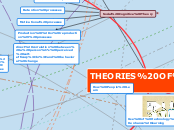THEORIES OF LEARNING
LEARNING DESIGN
How People Learn
Use of technology to enhance learning
Behaviorism
Motivation
Rewards
Culture
Response to stimuli
hypothesis behind behavioralist learning theories is that all learning occurs when behavior is influenced and changed by external factors
Genetic Factors; Environment(association /reinforcement)
Aristotle’s thoughts
John B. Watson
B. F. Skinner
Ivan Pavlov
Human behaviour
Knowledge
Teaching
Learning
Cognitivism
Focuses on the inner mental activities – opening the “black box" of the human mind is valuable and necessary for understanding how people learn
Learning
Organization
Elaboration
Lev Vygotsky
Zone of Proximal Development
Piaget
Assimilation
Accommodation
Equilibration
Learning strategies
convergent thinking
divergent thinking
critical thinking
cognitive dissonance
Cognitive Development Stages
Subtopic
Cognitive development
Constructivism
Learner-centric
Commitment
Involvement
Investigation
Social Interaction
Formal learning environments
Theory of Identity Development
Theory of Multiple Intelligences
Verbal/Linguistic, Logical/Mathematical, Visual/Spatial, Bodily/Kinesthetic, Musical, Interpersonal, Intrapersonal, Naturalisti, Existential Intelligence
Bloom's Taxanomy
Kowledge
Skills
Attitude
Knowledge,
Comprehension, Application, Analysis, Synthesis, and Evaluation
Theory of Human Motivation
hierarchy of needs
Motivation
Information Processing Theory
sensory
memory
short-term memory
long-term memory
addresses how people respond to the information they receive through their senses and
how they further process those information with steps of attention, forgetting, and retention.
Social Cognitive Theory
Attentional processes
Retention processes
Motivational processes
Production (or reproduction) processes
direct correlation between a person's perceived self-efficacy
and behavioral change
performance accomplishments, vicarious experience, verbal
persuasion, and physiological states
Sociocultural Theory
significance of culture
principal proponent of culture: language
student’s
relationship with and development within this sociocultural world
Bioecological Model of Human Development
Context
Settings
Ecologies
Biological Processes, Cognitive Processes, and Socioemotional Processes
Theory of Moral Development
Moral decision making & reasoning
Pre-Conventional
Conventional
Post-Conventional
Environmental Interaction
Social Interaction
Behaviour
Experiential Learning Theory
Setting goals
Thinking
Planning
Experimentation
Reflection
Observation
Review
Technological Teaching Tools
mBot
Gizmos
Games
Examples: board games, puzzles
Flipgrid
Connectivism
Radical Behaviourism
Classical Conditioning
Operant Conditioning
